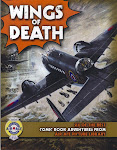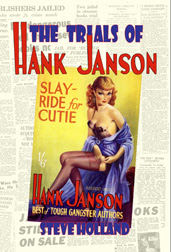 Oliver Anderson I mentioned briefly about a month ago and I thought you might enjoy a look at some of his other books. All three are from Anderson's Guy Random series, described thus: "Guy Random is the typical Anderson hero coaxed into full blossom: dashing, resourceful, nonchalant, with a touch of piratical ruthlessness under the glossy charm and suave courtesy. By occupations he is a "Professional Negotiator" who excels in "arranging matters," i.e., he will fix anything for anybody—for a suitable fee."
Oliver Anderson I mentioned briefly about a month ago and I thought you might enjoy a look at some of his other books. All three are from Anderson's Guy Random series, described thus: "Guy Random is the typical Anderson hero coaxed into full blossom: dashing, resourceful, nonchalant, with a touch of piratical ruthlessness under the glossy charm and suave courtesy. By occupations he is a "Professional Negotiator" who excels in "arranging matters," i.e., he will fix anything for anybody—for a suitable fee."The books are entertaining romps that pre-dated the bawdy comedies of Tom Sharpe by years. Indeed, Anderson had written his first comic novel at the age of 25 when he was working on the Nottingham Guardian and Evening Post. It appeared under the pen-name Julian Pine and was a thinly veiled attack on small town corruption. Too thinly veiled, as it turned out, because Anderson, educated King's School, Grantham, and working at the Grantham office of the paper, suddenly became a cause célèbre in the Lincolnshire town. Lord Brownlow, Lord Lieutenant of Lincolnshire, Keeper of the Rolls and Lord-in-Waiting to the Duke of Windsor, believed he had been written into the book in the shape of local big-wig Lord Wycherly. Members of the local council also saw echoes of themselves and there was talk of a issuing writs for libel against the author.
Not surprisingly, the publisher withdrew the book, which had only been on the shelves for three weeks but was selling briskly; although the solicitor for Nicholson & Watson said the the withdrawal was by no means an admission that the book was connected with living persons, the Grantham Journal made much of the publishers' grovelling apology to the Mayor of Grantham, the local MP and various other personages.
Anderson gave up writing after a second novel and went into business before joining the army in 1939, seeing action with the Royal Artillery at Alamein and Tunis before returning to England. He was back in Europe in D-Day plus 2.
Born Oliver Charles Anderson in the village of Snitterby, Lincolnshire, on 30 September 1912, he was the second child of the Rev. Robert Anderson, Rector of Little Ponton. He returned from the war to live with his mother in the village of Harlaxton, and was to live in the same cottage on Swine Hill the next 50 years. He took up his pen again and produced a dozen novels before retiring from writing in 1969. The books earned him some considerable praise—"Oliver Anderson is a real old-fashioned funny man... he writes in a gay style somewhere between Evelyn Waugh and P. G. Wodehouse" (Daily Telegraph); "Mr. Anderson's brand of humour and thrills takes a lot of beating" (Manchester Evening News)—but, Anderson claimed, he was "overcome by the spirit of the times". He continued to lead a simple, cheerful life, wanting only a comfortable armchair, a warm fire and a life of peace and reason. He read, listened to classical music, and would take daily walks of 10-12 miles, relying on his bicycle for longer journeys.
Rotten Borough was reprinted in 1989 when it was realised that the cast of his Grantham-based novel included in its cast the character Sam Nurture, a corrupt corner shop grocer and councillor almost certainly based on Councillor and local grocer Alf Roberts, father of Margaret Hilda Roberts, later to become Prime Minister Margaret Thatcher. Anderson always denied that the characters in his novel were based on real people and especially that there was any connection between his character Nurture and Roberts.
Anderson, who never married, died on 19 October 1996, aged 84.
The female of the species is more frisky than the male? Undoubtedly so—at any rate amongst the glossy patrons of that fashionable out-of-town retreat, Little Fidget.
__Taking an apparently hum-drum assignment there, Guy Random finds himself caught up in the trickiest situation of his career—a ruthless battle between four gorgeous women for the possession of two rich males.
__In order to solve it, he is forced into dangerous relations with the entire female quartet!
This hilarious novel is the successor to "Random Rapture", which we published so successfully in this series last autumn, and it features the same central character, Guy Random, professional Negotiator—who will fix anything for anybody... for a suitable fee.
Guy Random makes his bow in the temporary guise of a secret agent, arranging matters of the utmost international urgency in the glamorous surroundings of the Spanish Costa Brava. His mission plunges him into a vortex of perils both physical and moral wherein he is greatly aided by Leslie Spindle, a provincial grocer of romantic notions and frustrated fancies. He is equally impeded by the ravishing Fanny Traverse, the volcanic Consuela and the notorious Mrs. Sheath, "luscious as an over-ripe pomegranate," whose smile is "a third-degree burn".
__Underlying all is the smouldering mystery of the Tears of Venus, which is not only a mystery but also that very rare thing in humorous fiction: a really new comic device.
PUBLICATIONS
Novels
Rotten Borough (as Julian Pine). London, Nicholson & Watson, 1937; reprinted as by Oliver Anderson, London, Fourth Estate, 1989.
Guilt-Edged (as Julian Pine). London, Nicholson & Watson, 1938.
In For a Penny. London, Arthur Barker, 1950.
Grit and Polish. London, Arthur Barker, 1951.
Painless Extractions. London, Arthur Barker, 1952.
Smiling Tigers. London, Arthur Barker, 1953.
Thorn in the Flesh. London, Arthur Barker, 1954.
Random Rendezvous. London, Arthur Barker, 1955.
Random Mating. London, Arthur Barker, 1956.
Random Rapture. London, Arthur Barker, 1958.
Random at Random. London, Arthur Barker, 1959.
Random All Round. London, Arthur Barker, 1960.
Ripe For the Plucking. London, Arthur Barker, 1961.
The Last Mirage. London, Barrie & Jenkins, 1969.
(* Information on Anderson is derived from obituaries from The Independent by Andrew Bond (11 November 1996) and The Guardian by Richard Boston (16 November 1996).)


























































Please will someone release all of Oliver Anderson's book as eBooks. My printed copies have long ago worn out
ReplyDelete